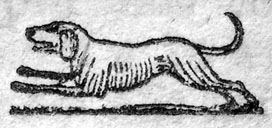
I used to think I had figured out the dog brain: Dogs have an associative memory but not a historical one. For example, if dogs hear the jingle of the leash, they know to expect a walk. They recognize people after years of absence, because they are reminded at once of the fondness (or anxiety) they once felt with them. But although they’re very good at these associations and remember them a long time, they can’t put them in any chronological order. Few dogs like to be on a leash, but if you praise a dog lavishly every time you put the leash on, they submit happily, because no matter how many times it happens, they never really figure out that the state “being on a leash” always follows the event “putting on a leash.”
My killer example for this was my dog’s response one day to a neighbor she loved more than anyone else in the world (and who is still, I suspect, my dog’s favorite person, even though the neighbor has lived on the other coast for the last few years). Returning from a walk, my dog and I saw the neighbor leaving our building. My dog greeted her with enthusiasm and then looked longingly at her over her shoulder as she walked away. Moments later, inside the building, we passed my neighbor’s apartment on the second floor, and my dog hurled herself against the door, hoping to find her friend inside. She had recognized my neighbor; she had just said good-bye to her with impressive wistfulness; and she expected her to be waiting inside the apartment we had just seen her leave.
Excellent associative memory, no historical memory. But there’s a problem with my model. Whenever we take a trip, the infallible sign by which my dog recognizes that a car is in her future is my red dop kit. Its unzipping sends her into frantic and somewhat maddening barks of joy. If my theory were correct, the unzipping of this dop kit would arouse her when I unpack after a trip just as much as it does when I pack before one. But it doesn’t. After a trip, she listens equably, as if she remembers quite clearly that we’ve just come home. Even if half an hour has elapsed between our return home and the unzipping, she isn’t fazed. Is this evidence of a historical memory? Has she remembered a sequence? Or is my original theory correct, and she’s picking up a signal, ineffable to me but obvious to her, that overrides the signal of the unzipped dop kit? Such a signal would indicate “This is the unpacking pattern; no rides in the car are associated with it.” I haven’t been able to isolate the signal, however, and I have a strong incentive to; packing would be quieter if I knew how to trigger it.
The illustration above is from yet another advertisement for a Newfoundland in 19th-century newspaper, the Tribune of 31 January 1849. It’s not meant to look like a Newfoundland; it’s just the standard icon for dogs in classified ads. The ad reads “CALIFORNIA.—A large Newfoundland DOG for sale cheap. Inquire at the Bird store, 5 John-st.” In other words, someone was off to prospect for gold and had decided not to bring his dog.
